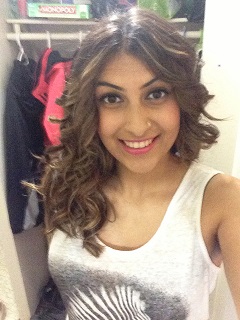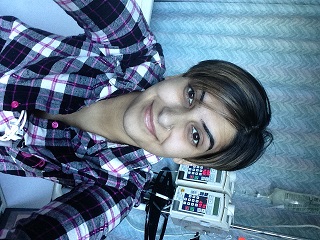More than 11 million donors have registered through Be The Match — one of the largest and most diverse bone marrow donor registries in the world.
But of those numbers, only 229,000 potential donors have identified as South Asian, according to Rebecca McRoberts, a spokesperson from Be The Match.
 Twenty-four-year-old Moneet “Money” Mann from Brampton, Canada, is one of many South Asian patients seeking a match to help her fight acute myeloid leukemia, a type of blood cancer in which abnormal cells are detected in bone marrow.
Twenty-four-year-old Moneet “Money” Mann from Brampton, Canada, is one of many South Asian patients seeking a match to help her fight acute myeloid leukemia, a type of blood cancer in which abnormal cells are detected in bone marrow.
Just a few weeks before her diagnosis, Mann had participated in a run to raise money for cancer research.
“At the time, Moneet had no idea that in the short future, she would become a cancer patient,” said sister Neetu Grewal.
Mann began noticing visible bruises on her body that appeared out of nowhere. Eventually, she began to feel very fatigued and experienced shortness of breath and other symptoms.
She was admitted to the emergency room where she was later given six transfusions. Several tests later, the doctors had diagnosed her with leukemia on October 2013.
Following her deteriorating health conditions, Mann withdrew from Lakehead University.
 “Being diagnosed with cancer is a scary thing. The journey is not easy and it takes a lot of determination. You have to believe that you will win this fight… keep faith and a positive outlook in life,” said Mann.
“Being diagnosed with cancer is a scary thing. The journey is not easy and it takes a lot of determination. You have to believe that you will win this fight… keep faith and a positive outlook in life,” said Mann.
Mann will continue to graduate with honors in April, but her dreams of obtaining a teaching degree have been halted for now.
The search for a donor has been challenging — especially when the number of registered South Asian donors on the national registry stands at 3 percent.
“It is sad to say a community that is so vast in numbers is so behind in numbers on the registry. The fear of registering I believe is that there is not enough education out there on what the process actually entails and how safe the transplants are for the donor,” said Grewal.
Close friends and family have recently launched Will You Marrow Me — a campaign that hopes to spread awareness about leukemia and other types of cancers. The goal is to help debunk common myths surrounding bone marrow and stem cell transplants, while also providing a space for support and open conversations.
In order to shed light on the issue, the family has released a video highlighting Mann’s story in Punjabi for a local ethnic channel. The message was intended to reach the older generation, particularly seniors in the Canadian Punjabi community as well as larger communities in the U.S. The video explains the process of donating as well as the personal story of Mann and the challenges she has faced:
“Our current campaign is to target the South Asian community but that is not to say we are turning others away either. There are many in need and every registered donor may be a potential match for someone already in need or in the future,” said Grewal.
According to the South Asian Marrow Association of Recruiters (SAMAR), South Asians comprise just 3 percent of donors in the Be The Match registry.
Over the last 21 years, SAMAR has recruited over 100,000 marrow donors of South Asian origin, according to community outreach and director of donor recruitment Moazzam Khan.
“Of the 11 million volunteer marrow donors, approximately 70 percent are Caucasian and all the minority and ethnic groups combined is less than 30 percent,” Khan told the Aerogram.
“South Asian is right at the bottom of the pile,” he says.
So why is it that South Asians and other minority groups remain at the ‘bottom of the pile?’
According to a recent story by Southern California Public Radio, there is a lack of understanding when it comes to the process of bone marrow donations — especially in some ethnic communities. There are also several religious and cultural factors that play a role:
“In many Asian communities,” Ito said, “there is a matriarch or patriarch who still controls the family to some extent, where a person will need to get permission from their parents and sometimes their grandparents before they can possibly donate.”
Also, in many immigrant communities, there hasn’t been a tradition of giving blood or signing up to be organ donors. Ito says part of that has to do with religious beliefs.
“There are still some faiths,” Ito said, “where they feel that a person’s body should not be tampered with or when one passes, they need to have their entire body as they were born, so to speak.” (“The struggle to find bone marrow matches is harder for some ethnic groups“)
Race and ethnicity have a significant impact on the ability to find a match, Be The Match spokesperson McRoberts told the Aerogram.
“Genetic diversity in various populations is affected by human migration, colonization and immigration patterns. The longer a population has been in a geographic area and the more accessible to migration results in greater genetic diversity,” said McRoberts.
Approximately 70 percent of patients do not have donors or a match within their own family, according to Be the Match Registry.
But the chances of finding a perfect match vary based on an individual’s tissue type.
“Tissue types are inherited so patients are most likely to match the tissue type of someone who shares their racial or ethnic heritage,” said McRoberts.
Despite the high number of matches among similar ethnic groups, there have also been matches found among different ethnic groups, though it is not as common.
Currently, Grewal and the Mann family are referring potential donors to the following registries: KMS Registry, the National Marrow Donor Program, the American Bone Marrow Donor Registry, The Gift of Life, and The Icla da Silva Foundation, Inc. Those residing in Canada can visit OneMatch.ca to register as a donor and order a swab kit directly to your home.
Mann continues to speak at public events in the hopes of spreading awareness and reaching out to others in similar predicaments.
For more information about Moneet and the Will You Marrow Me campaign, you can check out facebook.com/willyoumarrowme or send a tweet to @WillYouMarrowMe using the hashtag #ForTheLoveofMoney.
Toronto area readers can support Moneet Mann and get swabbed this weekend at a Will You Marrow Me Get Swabbed event on February 23 at Malton Gurdwara. Details are available on Facebook.
Monica Luhar is a freelance journalist, web producer and social media editor in Los Angeles. You can follow her on Twitter: @monicaluhar












